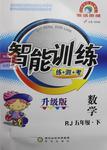题目内容
The terrible drought has captured worldwide attention. As responsible citizens, we must never ______ the terrible situation that our common home is faced with.
| A.overlook | B.miss | C.forget | D.overestimate |
A
解析

 互动课堂系列答案
互动课堂系列答案 激活思维智能训练课时导学练系列答案
激活思维智能训练课时导学练系列答案Far from the land of Antarctica (南极洲), a huge shelf of ice meets the ocean. At the underside of the shelf there lives a small fish, the Antarctic cod.
For forty years scientists have been curious about that fish. How does it live where most fish would freeze to death? It must have some secret. The Antarctic is not a comfortable place to work and research has been slow. Now it seems we have an answer.
Research was begun by cutting holes in the ice and catching the fish. Scientists studied the fish’s blood and measured its freezing point.
The fish were taken from seawater that had a temperature of -1.88℃ and many tiny pieces of ice floating in it. The blood of the fish did not begin to freeze until its temperature was lowered to -2.05℃. That small difference is enough for the fish to live at the freezing temperature of the ice-salt mixture.
The scientists’ next research job was clear: Find out what in the fish’s blood kept it from freezing. Their search led to some really strange thing made up of a protein (蛋白质) never before seen in the blood of a fish. When it was removed, the blood froze at seawater temperature. When it was put back, the blood again had its antifreeze quality and a lowered freezing point.
Study showed that it is an unusual kind of protein. It has many small sugar molecules (分子) held in special positions within each big protein molecule. Because of its sugar content, it is called a glycoprotein. So it has come to be called the antifreeze fish glycoprotein, or AFGP.
【小题1】What is the text mainly about?
| A.The terrible conditions in the Antarctic. |
| B.A special fish living in freezing waters. |
| C.The ice shelf around Antarctica. |
| D.Protection of the Antarctic cod. |
| A.The seawater has a temperature of - l.88℃ |
| B.It loves to live in the ice-salt mixture. |
| C.A special protein keeps it from freezing. |
| D.Its blood has a temperature lower than -2.05℃ |
| A.A type of ice-salt mixture. | B.A newly found protein |
| C.Fish blood. | D.Sugar molecule. |
| A.sugar | B.ice | C.blood | D.molecule |